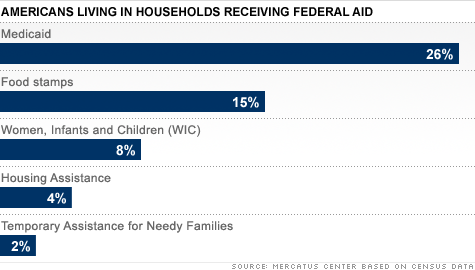
More than a third of Americans lived in households receiving government assistance in 2010.
NEW YORK (CNNMoney) -- More than one in three Americans lived in households that received Medicaid, food stamps or other means-based government assistance in mid-2010, according to a new report.
And when Social Security, Medicare and unemployment benefits are included, nearly half of the nation lived in a household that received a government check, according to the analysis of third-quarter 2010 Census data done by the Mercatus Center at George Mason University, a libertarian-leaning think tank. That's more than 148 million Americans.
Those numbers are on their way up thanks to the Great Recession and its aftermath, which have pushed record numbers of people onto public assistance programs. In particular, the stubbornly high unemployment rate has left millions of Americans in dire straits.
In 2008, one-quarter of people lived in households receiving a government lifeline and about 45 percent a government check, according to the Census Bureau.
The nation's safety net has become fodder for the 2012 election. Republican presidential candidates have accused President Obama and his party of turning America into an entitlement nation.
The federal government sent a record $2 trillion to individuals in fiscal 2010, up nearly 75% from 10 years earlier.
Just last week, Mitt Romney said he's not concerned about the very poor because they have an "ample" safety net. Meanwhile, Newt Gingrich said the federal government should create a trampoline to assist low-income Americans in escaping poverty.
Some 26% of Americans lived in households where someone received Medicaid, while the figure was 15% for food stamps. Those programs were by far the largest of the safety net.
Meanwhile, 16% of people lived in households collecting Social Security and 15% receiving Medicare benefits. These entitlements have been expanding as the Baby Boom generation retires.
The rapid growth of the nation's government assistance programs has concerned many on both sides of the political aisle.
"Whether we like it or not, we know it's not fiscally sustainable," said Veronique de Rugy, senior research fellow at Mercatus. "The bigger these programs, the bigger the voting block is against reform."
Did you once receive government assistance, such as food stamps, Medicaid or housing vouchers, but now earn enough to have gotten off? Email realstories@cnnmoney.com with your contact information and you could be contacted for an upcoming story. ![]()
| Overnight Avg Rate | Latest | Change | Last Week |
|---|---|---|---|
| 30 yr fixed | 3.80% | 3.88% | |
| 15 yr fixed | 3.20% | 3.23% | |
| 5/1 ARM | 3.84% | 3.88% | |
| 30 yr refi | 3.82% | 3.93% | |
| 15 yr refi | 3.20% | 3.23% |
Today's featured rates:
| Latest Report | Next Update |
|---|---|
| Home prices | Aug 28 |
| Consumer confidence | Aug 28 |
| GDP | Aug 29 |
| Manufacturing (ISM) | Sept 4 |
| Jobs | Sept 7 |
| Inflation (CPI) | Sept 14 |
| Retail sales | Sept 14 |